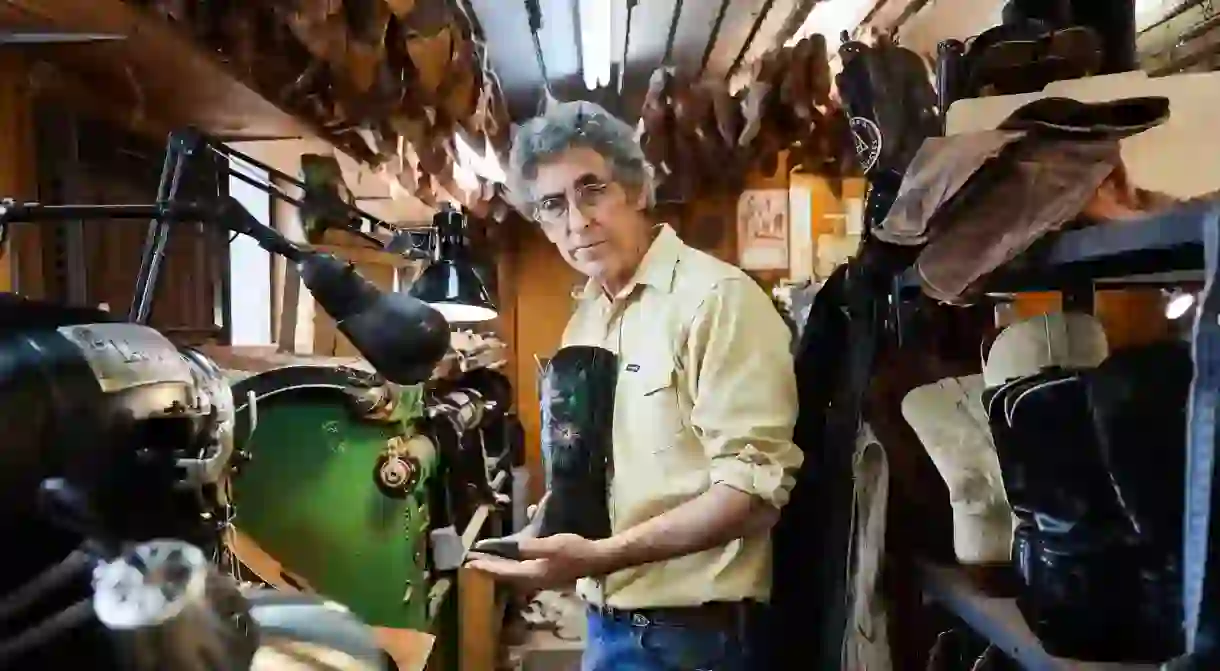Lee Miller: The Master Of The Cowboy Boot

The cowboy boot is a timeless wardrobe staple, worn all over the US and beyond as a statement of Americana. Designer Lee Miller of Texas Traditions explains why there’s no substitute for quality craftsmanship.
An Hermès Birkin bag. A Savile Row suit. A pair of Lee Miller cowboy boots. These are some of fashion’s most coveted items.
Being this popular is a double-edged sword for Miller, head designer of the world-famous cowboy boots that are sold exclusively at Texas Traditions in state capital Austin. You currently have a better chance of copping a Birkin than a pair of Miller’s boots: Texas Traditions doesn’t sell ready-to-wear pairs, and Miller and his team are working on whittling down a four-year waiting list. Singers Lyle Lovett and Harry Connick Jr are fans, but Miller also designs boots for everyday cowboys – in good time. “You can only make a certain number of boots,” he says, earnestly.

Aesthetically, the Lee Miller boot takes cues from the golden age of cowboy boots – the 1930s to the 1950s.
“I like to look at the history for patterns,” Miller says. Expect Texas Traditions cowboy boots to adhere to classic lines when it comes to the silhouette of the toe, heel and side. When it comes to personal taste, the designer favours medium browns and earth tones, but he will customise the boots with “anything you want to add to enhance the design” – within reason. Miller will roll with customers’ ideas (“This pair I’m working on right now has Arabic lettering on it”), but he has the final say on the designs the brand will produce. And don’t expect any bedazzling; Miller does not inlay jewels, but rather keeps decoration to embroidery. “My favourite is the fancy, colourful stitching you see on the tops of boots,” he says.

Boots start at a base price of $2,900 for a non-exotic leather such as French calf, kangaroo, Spanish bullhide or water buffalo; exotic leathers such as ostrich, alligator and crocodile cost more, while elaborate stitching and inlay work can hike up the price further still.
To understand the allure of Miller’s cowboy boots is to understand the rituals of the Lone Star State. What Miller offers is more than exquisite artisanal quality (although that is a major draw): it’s an authentic slice of Texas history. Before Miller took over in 1986, Texas Traditions was run by legendary bootmaker Charlie Dunn, who was immortalised in Jerry Jeff Walker’s 1972 song of the same name. Born into a family of cobblers in 1898, Dunn – the “Michelangelo of cowboy boots” – is credited with popularising modern cowboy fashion, not only in Texas but worldwide, outfitting everyone from US army soldiers to country music stars with his custom boots.

“I knew the Walker song about Charlie,” says Miller, a self-professed fan of quintessential 1960s and ’70s rock having grown up on Cream and Crosby, Stills & Nash. “When [Dunn] approached me to apprentice for him in 1977, I knew it was a big deal.” Indeed, this proved to be a pivotal point in Miller’s career. Previously, the Vermont native had been designing boots for the outdoor adventure company Merrell, as Randy Merrell, the company’s co-founder and head designer, had been Miller’s classmate in a boot-making program at the University of Tulsa. In 1986, Miller bought Texas Traditions from Dunn and took over the business.

“The things I do today are things [Dunn] taught me,” says Miller, referencing the Dunn fit, anatomically engineered for maximum comfort, which distinguishes his bespoke cowboy boots. After all, what good are handsome boots if they cramp the foot? “Charlie also employed Mexican artisans who brought in stitching traditions that we incorporate,” he adds. While the inlaid pinched-rose stitching is Dunn’s design legacy, Lee Miller’s signature is an inlaid tulip. “The boots from the 1920s and ’30s are so floral and innovative, and that’s an inspiration,” Miller says.

While the Lee Miller boot builds on the tradition of the Charlie Dunn boot, it is subtly different, both in fit and aesthetics. Miller seeks to improve upon the Dunn tradition by studying everything from US army reports on the foot dimensions of soldiers to Shoemaker of Dreams, the autobiography of Salvatore Ferragamo, an Italian shoe designer. “Ferragamo teases us about the secrets of fit, but never comes out and says what these secrets are,” says Miller. “But I discovered them.” Miller’s techniques for accurate sizing include precise foot measurements and profiling to create a bespoke last – a wooden mould of the foot – for each pair of boots.

Currently, Miller employs four apprentices to take his work into the future. One of them is Charlotte Marshall, a young designer with a degree in craft-based arts, who has been working for Miller for three years. She was compelled to join Texas Traditions to make what she calls “wearable art”, historic cowboy style for the modern individual. “The cowboy boot hasn’t really changed much from the 1930s,” she says. “But the constant vintage appeal of the cowboy boot keeps coming into style.”
In the context of today’s fast-fashion, rush-delivery shopping culture, Miller’s approach to style is nostalgic. But since the boots are timeless, they’re worth the wait for devoted customers. “The wait list makes you all the more wanted,” he says. In the meantime, anyone coveting a pair of Miller originals should contact him personally: the bootmaker responds to email and Instagram queries, and will take on new clients eventually. “When there’s a lull in the action,” he says, “you can get boots.”














